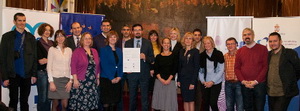 The European Integration Office of the Government of the Republic of Serbia signed a Memorandum of Cooperation in the field of planning, programming, monitoring and reporting on international development assistance with nine partner civil society organizations, including: Belgrade Center for Security Policy, European Movement in Serbia, National Alliance for Local Economic Development (NALED), Belgrade Open School, Young Researchers of Serbia, Center for Ecology and Sustainable Development (CEKOR), Chamber of Commerce of Serbia, Association for the Development of the Ibar Valley Kraljevo (IDA) and Civil Initiatives.
The European Integration Office of the Government of the Republic of Serbia signed a Memorandum of Cooperation in the field of planning, programming, monitoring and reporting on international development assistance with nine partner civil society organizations, including: Belgrade Center for Security Policy, European Movement in Serbia, National Alliance for Local Economic Development (NALED), Belgrade Open School, Young Researchers of Serbia, Center for Ecology and Sustainable Development (CEKOR), Chamber of Commerce of Serbia, Association for the Development of the Ibar Valley Kraljevo (IDA) and Civil Initiatives.
The basic goal of the Memorandum is the institutionalization of the relation between the European Integration Office and sectoral civil society organizations (SECO) and undertaking the obligations for implementing joint activities and the regular exchange of information during the process of planning, programming, monitoring and reporting on the international development assistance. The signatories of the Memorandum are leading SECO organizations in cooperation with the public administration in nine different areas – eight sectors (justice, internal affairs, public administration reform, competitiveness, energy, environment and climate changes, human resources and social development, agriculture and rural development), as well as three thematic areas (culture, media and civil society).
Cooperation with SECO organizations involves: consultations, participation in the work of sectoral workgroups preparing proposals for using EU funds, organizing trainings, etc. The European Integration Office is the chief coordinator of work at the level of the SECO mechanism. Each SECO leads at least three, and at most five organizations, with one taking the lead and coordinating activities. Thus far, 418 civil society organizations got involved in this mechanism from across Serbia.
Forming and implementing cooperation programmes with CSO is financed with the assistance of the Swedish International Development Agency (SIDA) and the Department for International Development of the UK Government (DfID). The SECO mechanism was established in 2011 to improve the dialog between public authorities and civil society in the process of programming and increasing the efficiency of using development funds, particularly EU funds.
Source: www.seio.gov.rs
 Government of the Republic of Serbia
Government of the Republic of Serbia














 pdf [271 KB]
pdf [271 KB]
Leave a Comment